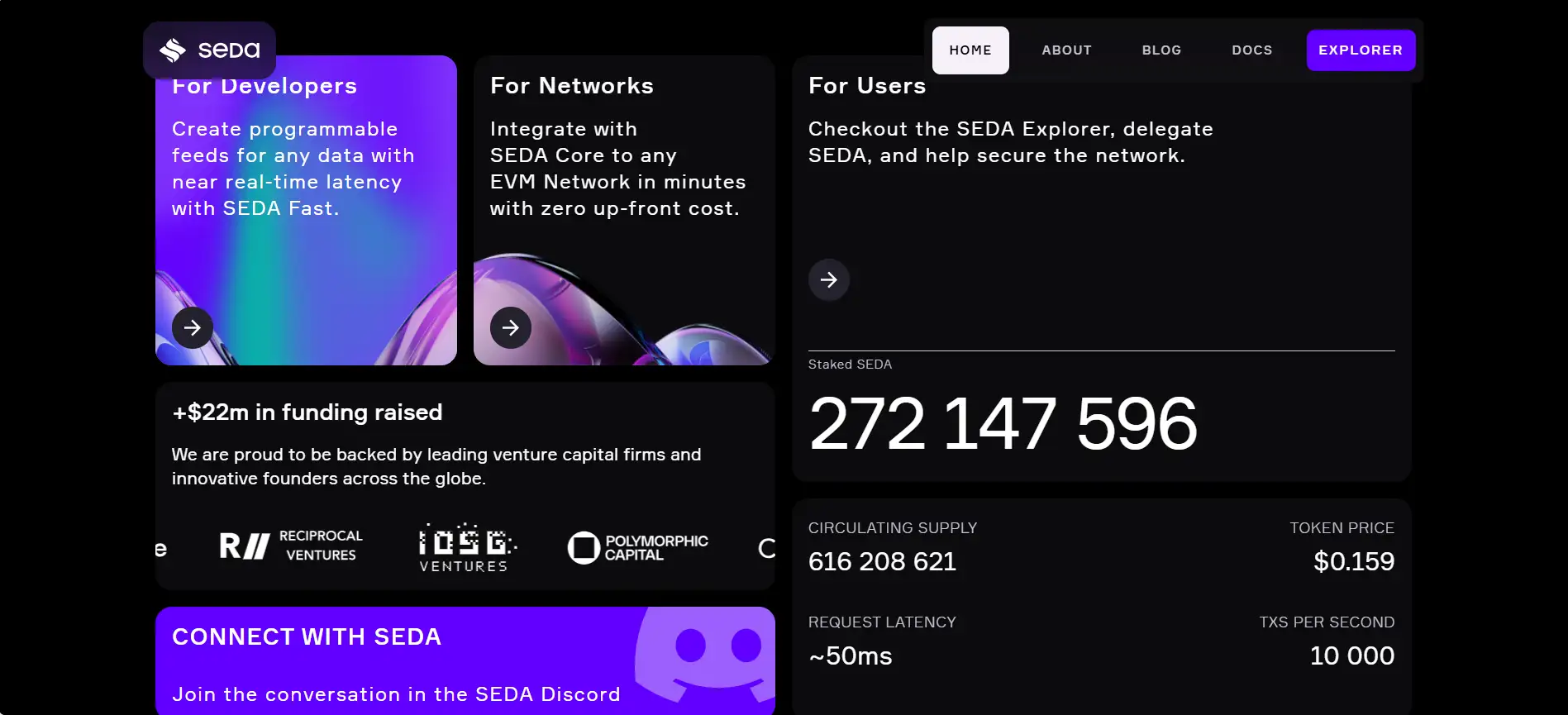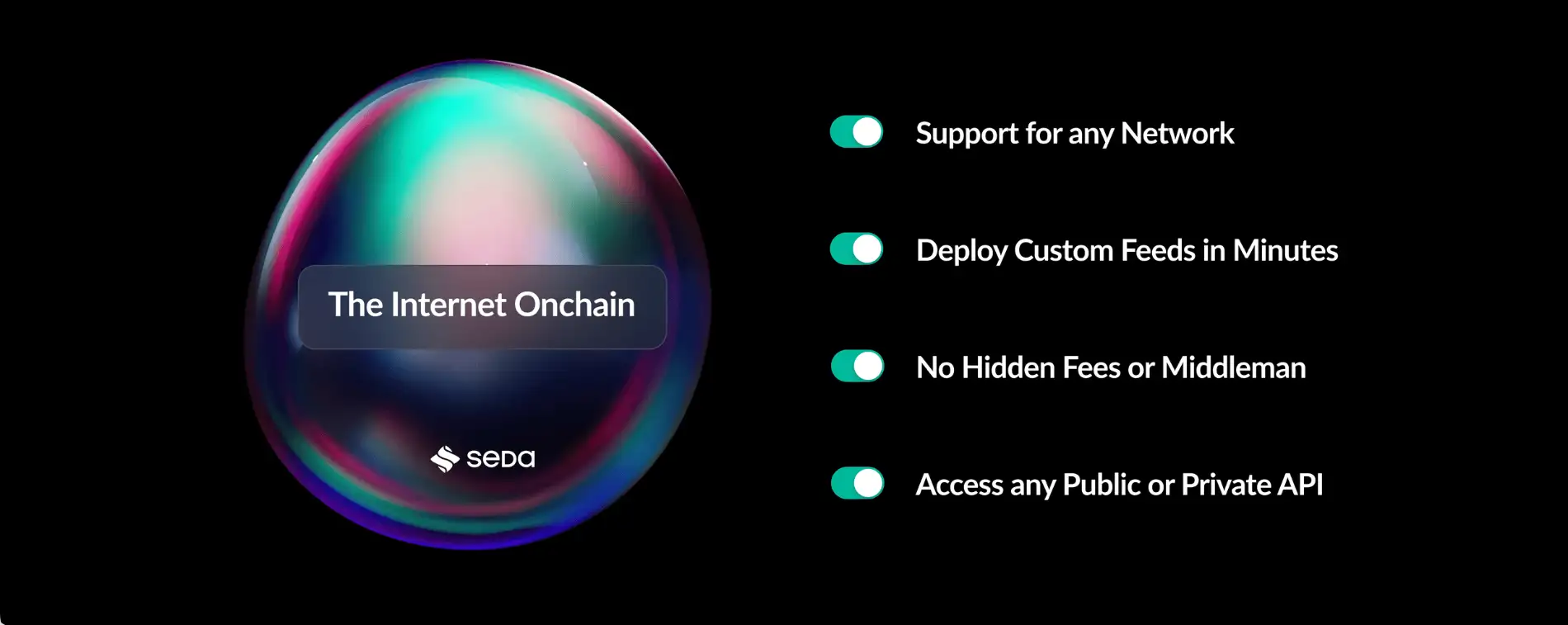About SEDA
SEDA is a next-generation oracle infrastructure layer purpose-built to bring the entire internet onchain. Designed for developers, networks, and data providers, SEDA enables programmable access to real-world data across multiple chains through custom oracle feeds, low-latency APIs, and permissionless infrastructure. With over $22 million in funding from top investors including Coinbase, Coinfund, and Distributed Global, the project is shaping the future of decentralized data delivery.
The core mission of SEDA is to create an open, accessible, and programmable oracle standard that can integrate with any application across the blockchain ecosystem. Whether you’re building DeFi tools, prediction markets, real-world asset platforms, or institutional data integrations, SEDA allows developers to deploy oracles for more than 18 million tokens and 11 million+ data symbols in under a minute.
SEDA reimagines oracle architecture by offering two distinct frameworks—SEDA Core and SEDA Fast—both tailored to meet different application needs in the blockchain space. The project is focused on building the infrastructure needed to allow data to flow freely between public blockchains and real-world systems, unlocking use cases ranging from high-frequency trading to prediction markets, RWAs, and decentralized AI.
At its foundation, SEDA operates its own Layer 1 blockchain designed for oracle functionality. SEDA Core is a fully permissionless and decentralized network designed for trustless data access. It includes support for push/pull data models, modular architecture, and finality times under 15 seconds. It is optimal for decentralized apps that prioritize security, transparency, and flexibility. On the other hand, SEDA Fast is a high-performance, low-latency solution that serves real-time data use cases like perpetuals, options, and trading platforms. It offers latency under 50 milliseconds and is accessible via authenticated API endpoints.
SEDA’s programmable oracle layer allows developers to set up custom feeds from any data provider—public or private—and publish them to supported EVM networks in seconds. Integration is simple, with developer docs and hosted infrastructure available for streamlined onboarding. Additionally, users can stake and delegate the SEDA token to help secure the network via the SEDA Explorer or Keplr Dashboard.
SEDA supports a wide variety of data types, including US equities, ETFs, commodities, crypto, forex, real estate, private equity, treasury rates, and more. Its compatibility with any EVM network, combined with its zero up-front integration cost, makes it a practical choice for developers who need scalable, trustless access to real-time data.
In terms of ecosystem positioning, SEDA competes with platforms like Chainlink, and Pyth Network. However, its dual-product architecture, emphasis on latency optimization, and modular programmability set it apart from more monolithic solutions. SEDA is building not just an oracle protocol—but a full data infrastructure layer for Web3.
SEDA offers a wide range of features that position it as a modular and flexible oracle solution for Web3:
- Dual-Product Architecture: Choose between SEDA Core for permissionless, decentralized data delivery, and SEDA Fast for ultra-low-latency real-time feeds.
- Extensive Symbol Coverage: Over 11 million symbols supported across 18 million tokens, including equities, FX, crypto, and more.
- Sub-Second Latency: SEDA Fast achieves latency as low as 50ms, ideal for real-time data delivery in high-performance environments.
- Custom Oracle Programs: Developers can deploy oracles for any data type in under a minute without waiting for provider onboarding.
- On-Chain and Off-Chain Compatibility: Fully modular system supports trustless publishing to any EVM chain.
- Zero Upfront Integration Cost: Projects can integrate with SEDA Core at no initial expense, making it accessible for all project stages.
- Token Delegation: Users can delegate SEDA tokens to help secure the network and participate in the oracle economy.
- Developer Friendly: Rich documentation, pre-built oracle examples, and hosted infra make setup and testing simple.
SEDA offers a fast, modular onboarding process for developers, users, and networks looking to leverage programmable oracle infrastructure. Here’s how to get started:
- Visit the platform: Navigate to SEDA and explore the homepage for key product details.
- Choose your product: Decide between SEDA Core for decentralized oracle programs or SEDA Fast for high-speed, low-latency integrations.
- Explore the docs: Use the official SEDA Documentation to follow integration guides and architecture breakdowns.
- Test Oracle Programs: Browse or deploy example oracles for common data types through the builder interface or CLI.
- Join the community: Connect with other developers and users in the SEDA Discord to ask questions and share feedback.
- Delegate tokens: Secure the network by staking and delegating through the SEDA Explorer or Keplr Dashboard.
- Stay updated: Read the SEDA Blog for protocol updates, data provider announcements, and growth stats.
SEDA FAQ
SEDA provides a programmable oracle layer that allows developers to deploy custom data feeds from public or private sources without needing prior whitelisting. Using its modular architecture, developers can choose between SEDA Core for decentralized deployments or SEDA Fast for low-latency access. With pre-built templates and streamlined Prover Contracts, oracle programs can be set up in under a minute and integrated with any EVM chain.
SEDA Core is a fully permissionless oracle infrastructure built on the SEDA Layer 1, enabling trustless data access and finality in ~15 seconds. It’s ideal for decentralized apps needing transparency and flexibility. SEDA Fast is designed for real-time data delivery, offering latency as low as 50 milliseconds. It uses a hosted authenticated endpoint and is optimized for high-speed, low-latency applications like trading or perpetuals. Both solutions share modular design but serve different performance needs.
SEDA Fast uses a streamlined data pipeline combining authenticated endpoints, minimal on-chain logic, and an optimized solver network. This architecture allows data to be fetched, verified, and published to blockchain applications in as little as 50 milliseconds. Internal benchmarks have shown consistent performance suitable for latency-sensitive use cases like high-frequency trading and live market data.
SEDA supports a wide spectrum of data feeds including US equities, ETFs, commodities, crypto tokens, forex, options, real estate, prediction markets, US treasury rates, and more. Developers can pull from over 11 million supported symbols and 18 million+ tokens. The network accommodates both public and institutional-grade private data providers, enabling a truly customizable and extensible oracle framework.
Users can delegate SEDA tokens to validators and contribute to securing the oracle network. Staking can be done directly via the SEDA Explorer or through the Keplr Dashboard. By staking, users not only support the decentralization and performance of the network but also earn rewards for participating in the consensus and data verification processes.
You Might Also Like












